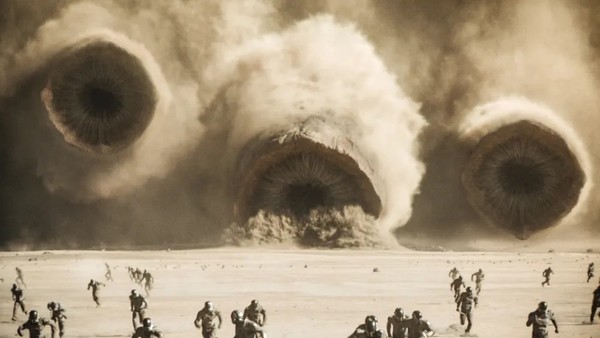In 2021, award-winning director Denis Villeneuve captivated the world with his adaptation of the notoriously “unadaptable” masterpiece by Frank Herbet — Dune. Three years later, Villeneuve once again leaves audiences in awe with Dune: Part 2, a sci-fi cinematic experience that will remain unmatched for years to come.
The science fiction genre has practically become synonymous with the Star Wars franchise for as long as most of us remember. As such, any space opera, sooner or later, is forced to walk under the shadow of Star Wars. However, the franchise has seemingly lost its magic in recent years, far from the craze it induced at the height of its popularity. The lukewarm reception of recent sci-fi projects left a vacuum in the genre, and Dune’s return to the screens in 2021 could not have come at a more opportune time.
Many were rightfully skeptical of Dune since the 1984 adaptation of one of the best selling sci-fi novels of all time was a disappointment. At a glance, it may not seem obvious why Dune was such a risk to adapt. After all, who doesn’t want to watch a movie about factions fighting over resources in space? However, in the source material, the battles were internally fought against one’s self and through treacherous conversations as much as they were fought in the field. A film like that would stick out like a sore thumb in the age of endless media consumption, which is why it was all the more impressive when Villeneuve managed to successfully translate the intellectual and visual allure of Dune to the screen.
Dune: Part 2 not only makes the most out of the good will the prequel built with the general audience, but also cements the franchise as part of sci-fi movie history. Strong performances from the cast commands full attention from the audience. In particular, Austin Butler as Feyd-Rautha Harkonnen and Javier Bardem as Stilgar were magnificent. Butler’s Feyd-Rautha oozed out confident brutality in every scene; he was a perfect foil to Timothée Chalamet’s Paul Atreides. Meanwhile Bardem’s Stilgar perfectly conveyed the tragedy a messianic prophet can create. Bardem perfectly portrayed Stilgar’s spiral from a religious, yet autonomous, individual to a body of flesh acting out of religious fanaticism.

Moreover, Villeneuve once again amazes our visual and auditory senses right from the get-go and never lets up, making the 2 hours 46 minutes of runtime seem like nothing. The technical aspects of the film matches, if not surpasses, the magnificent performance of the cast. The visuals of the film were breathtaking, but the sound design is what really brings it over the top. Every monumental occasion will send chills down your spine due to how genius the sound design was. One scene that will surely remain with the audience was the moment when Paul Atreides manages to ride a sandworm. At face value, riding a sandworm was an impressive physical feat, but it was more than that. That moment is also when Paul Atreides truly becomes a Fremen, and the sound design, alongside brilliant cinematography, is what conveys that message.
Dune: Part 2 was a perfect pay off from the first movie — cryptic dialogue received clarity, inevitable conflict resolved with blood, and ominous prophecies hauntingly fulfilled. Yet even while concluding several plotlines, Dune: Part 2 also manages to expand its world further than before, perfectly setting up the third movie of the franchise while standing strong as a movie itself. For every mystery solved and foe vanquished, we, the audience, are constantly reminded that what we are witnessing is only a small speck of the universe at large. The feeling of witnessing a momentous occasion firsthand in such a vast universe is what makes sci-fi special, and the Dune franchise has managed to capture that magic. Just like the Lisan al Gaib, the messiah, Dune reminded us how great science fiction movies can be. Villeneuve remained faithful to the book, to the sci-fi genre, and trusted that people will appreciate a space opera for what it is; for that, the Dune franchise has been rewarded.
It’s no surprise that a book about giant sandworms, spaceships, interstellar travel, warring great houses, false prophets, manipulative religious orders, an addictive substance holding everything together, and the politics and scheming behind all of that is difficult to adapt. People thought that a faithful adaptation just won’t translate well to the screen and will always be doomed to fail. It turns out, however, that nothing is impossible when you put your faith in the audience.

